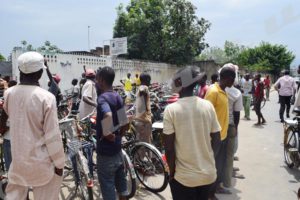Bicycle-taxi riders in the capital Bujumbura complain about the excessive fees and exorbitant prices for the purchase of plates and cardigans. Those bicycle-taxi riders grouped in a collective of two associations of Burundian bikers “Sotavedebu” and “Sotavebu” say each member must contribute BIF 50 to the first association and BIF 100 to the second one. “We must contribute. We have no choice”, says Bikorimana, a bicycle-taxi rider met in Cibitoke neighborhood in the capital Bujumbura.

Bicycle-taxi riders denounce the robbery observed in their daily activities
In case of non-payment, he says, bicycles are confiscated and their recovery requires giving bribes. “We often pay BIF 2,000. Otherwise, the association agents persecute the recalcitrant”, he says.
Another bike rider operating in the northern capital Bujumbura says many are victims of their destitution. “We are unable to buy cardigans or license plates”, he says.
Their prices are respectively BIF 13,000 and BIF 10,000. They say the requirement of BIF 23, 000 is just a robbery. “I have been arrested several times because I was working without a plate. I only had a cardigan”, he says.
They regret the existence of these associations which only seek their own interests. They say they prefer to work independently: “It would be more beneficial for us if we could work freely because the leaders of our associations do not intervene even in case of an accident”, he says.
Emmanuel Nimbona, Legal Representative of Sotavebu says it is a misunderstanding. “These lamentations are unfounded. The agents whose attitude is denounced are designated at the parking places. They come from them”, says Nimbona.
The Sotavebu Legal Representative says the issue related to the cardigans and number plates is invoked in the Traffic Code in its Article 434: “Every bicycle used for public transport must have a plate number issued by the municipality”, he says.
In April 2017, Burundi Transport Minister, Jean Bosco Ntunzwenimana suspended the measure taken by the Bujumbura Mayor to purchase plates for bicycle-taxi riders. He said the department in charge of controlling the transportation sector had not been consulted.














 IWACU Open Data
IWACU Open Data

